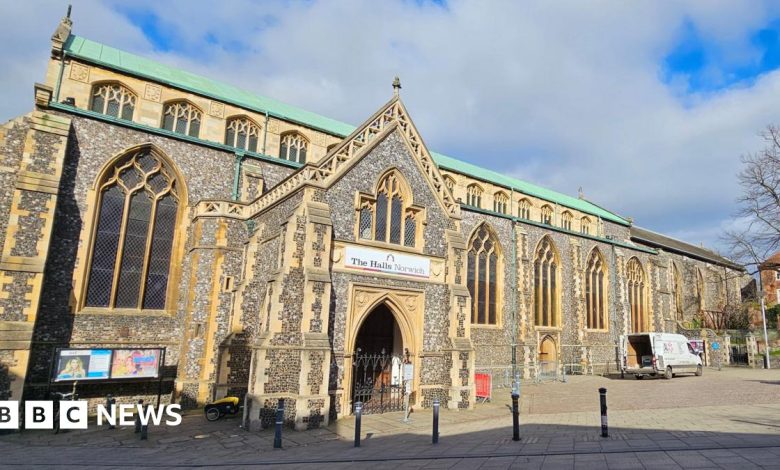Norwich City Council says it will run The Halls following row

Norwich Theatre Expresses Frustration Over Council’s Decision on The Halls Management
The historic venue known as The Halls in Norwich has become the center of a controversy between Norwich Theatre and the city council, highlighting tensions over the management of this beloved cultural space. At a recent council meeting, the future operation of The Halls—comprising the historic St Andrew’s and Blackfriars’ Halls—was questioned by Town Close ward councillor Karen Davis, who raised concerns about Norwich Theatre’s previous successful bid being overlooked. The inquiry came after the council’s unexpected termination of its procurement process, leaving many in the local arts community confused and disappointed.
Labour councillor Carli Harper, who oversees finance and major projects for the council, confirmed that the venue would indeed remain under direct council management rather than being operated by Norwich Theatre as previously planned. “We are committed to ensuring The Halls reopen to the public as quickly as possible,” Harper stated, “and we will be looking at our options in terms of putting suitable arrangements in place to best manage one of the city’s much-loved listed buildings.” This announcement marked a significant shift in the council’s approach, effectively sidelining Norwich Theatre despite their earlier successful tender bid, leaving the organization publicly expressing their disappointment with how the entire process had been handled.
The situation is further complicated by ongoing delays and budget concerns surrounding The Halls’ renovation project. The venue, which closed at the beginning of 2024 for refurbishment work, was originally scheduled to reopen earlier this year. However, the reopening has been repeatedly pushed back as costs have ballooned to £7.8 million—a figure that has raised eyebrows among local taxpayers and arts advocates alike. These delays and cost overruns have created additional pressure on the council to justify their decision-making process, particularly regarding why they’ve chosen to manage the venue internally rather than partnering with an established arts organization with a proven track record.
Norwich Theatre’s frustration stems not only from losing the management opportunity but also from what they perceive as a lack of transparency in the council’s decision-making process. Having previously won the contract through what they believed was a fair tender process, the organization was understandably taken aback when the council abruptly terminated the procurement exercise without clear explanation. This sudden reversal has raised questions about the council’s commitment to supporting local arts organizations and whether political considerations might have influenced their decision. For many in Norwich’s creative community, the situation represents a missed opportunity for collaboration between the public sector and an established cultural institution with deep roots in the community.
Despite the controversy, Councillor Harper has pledged that lessons will be learned from this procurement process, promising that improvements will be identified and implemented in future dealings. “We will be developing plans for the reopening of The Halls, to ensure our residents and creative community can benefit from this wonderful asset as soon as possible,” she assured those present at the meeting. However, these assurances have done little to quell concerns among arts advocates who worry that direct council management might not provide the specialized expertise and programming vision that Norwich Theatre could have brought to this historic venue, potentially impacting the quality and diversity of cultural offerings available to Norwich residents.
As The Halls’ renovation continues and reopening plans develop, the situation remains a significant talking point within Norwich’s cultural landscape. The venue, with its rich history and architectural significance, represents more than just a building—it symbolizes the city’s cultural heritage and its future artistic direction. How the council manages this asset going forward will be closely watched by residents, artists, and cultural organizations alike. The tension between efficient municipal management and specialized arts expertise continues to define this ongoing situation, with many hoping that whatever arrangement eventually emerges will prioritize making these “much-loved listed buildings” vibrant centers for community engagement and artistic expression once again.









ox4f53
5bq6jj
c5ej0v
**mitolyn**
Mitolyn is a carefully developed, plant-based formula created to help support metabolic efficiency and encourage healthy, lasting weight management.
Best Real Money Online Casino Australia Feel Unstoppable Now